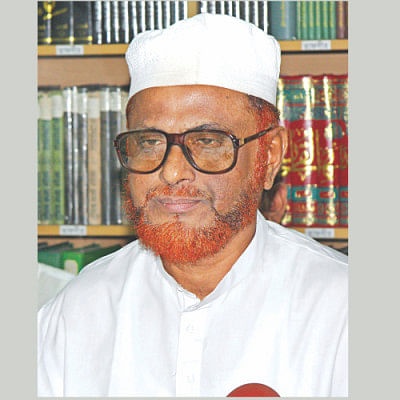Crimes Against Humanity: SC upholds Azhar’s death penalty

The Supreme Court yesterday upheld the death sentence of top Jamaat-e-Islami leader ATM Azharul Islam for his involvement in genocide and crimes against humanity during the 1971 Liberation War.
A four-member bench of the SC’s Appellate Division, headed by Chief Justice Syed Mahmud Hossain, delivered the verdict around five years after the International Crimes Tribunal-1 handed down capital punishment to Azhar for the crimes committed in Rangpur.
The apex court came up with a short verdict without disclosing the names of the judges who gave the majority and minority views.
It upheld four charges against Azhar, but acquitted him of another. The grounds and observations on which the court delivered the verdict could not be known immediately as the full text of the judgement was not released.
Azhar, now 67, was the commander of notorious Al-Badr force and president of Chhatra Sangha, the then student wing of Jamaat -- a party which opposed the country’s liberation -- in Rangpur during the 1971 war.
Following yesterday’s verdict, he now can file a petition with the SC seeking a review of the judgment. The petition will have to be filed within 15 days after the convict receives the certified copy of the verdict, according to court sources.
If the SC rejects the review petition, Azhar, an assistant secretary general of Jamaat, can seek president’s clemency. If the president does not grant the mercy, the SC verdict will be executed.
As a norm, Azhar, now in Gazipur’s Kashimpur Jail-2, was not brought to the SC yesterday when the verdict was delivered.
He heard about the judgement through radio and one of his representatives, said Shishir Manir, a defence lawyer for the Jamaat leader, while talking to The Daily Star.
BNP leader Khandaker Mahbub Hossain, the principal defence lawyer for Azhar, told this correspondent that his client was not involved in any offence and that they would move a review petition.
Attorney General Mahbubey Alam told reporters at his office that Azhar was convicted on the basis of specific charges and the testimonies of eye witnesses.
He hoped that the SC would release the full text of the verdict soon.
Law Minister Anisul Huq told The Daily Star that the government would execute the apex court verdict on completion of all legal procedures.
Expressing satisfaction at the judgement, he said Bangladesh has moved one step ahead in ensuring justice and rule of law.
Five Jamaat leaders have already been executed for committing crimes during the Liberation War while another senior leader, Delawar Hossain Sayedee, is serving jail until death for the same offences.
OFFENCE AND PUNISHMENT
As a leader of Islami Chhatra Sangha and the Al-Badr, Azhar played a significant role in the atrocities and aided the Pakistani occupation troops in committing horrific crimes, according to ICT-1 which gave capital punishment to him.
The court said the verdict was delivered against him for his involvement in killing 1,400 civilians in Jharuarbeel, a wetland in Rangpur’s Badarganj upazila.
Terrified of the marauding Pakistan army and its local collaborators, they fled their homes and took shelter at Jharuarbeel, but men, women and children from a dozen villages still could not save themselves from the cold-blooded savagery on the summer noon of April 17, 1971.
Pakistani army men and armed members of local Chhatra Sangha surrounded the villagers crouching in the swamp bushes and unleashed a bloodbath. Within five hours, they killed some 1,200 innocent people.
The man who planned it all is Azhar and he himself took part in the massacre. He and his men also picked up more than 200 Hindu people and students from the area and killed them after taking them to an unknown place.
The SC court upheld the verdict.
The apex court also upheld his death sentence for the killing of at least 14 people in Badarganj upazila in Rangpur and genocide when four Hindu teachers of Rangpur Carmichael College and wife of one teacher were killed. Azhar was a student of the teachers and a resident of the upazila.
The SC also upheld his five-year imprisonment for torturing a freedom fighter and his brother.
The court, however, acquitted him from another charge of raping a woman in Rangpur Town Hall. The tribunal had given him 25-year jail for the charge.
Two war crimes tribunals have so far delivered 40 verdicts against 94 people. Of them, 68 have been sentenced to death. Twenty-nine appeals are now pending with the SC.
Jamaat leaders Motiur Rahman Nizami, Abdul Quader Mollah, Muhammad Kamaruzzaman, Ali Ahsan Mohammad Mojaheed, Mir Quasem Ali and BNP leader Salauddin Quader Chowdhury have been executed for war crimes.

 For all latest news, follow The Daily Star's Google News channel.
For all latest news, follow The Daily Star's Google News channel. 



Comments